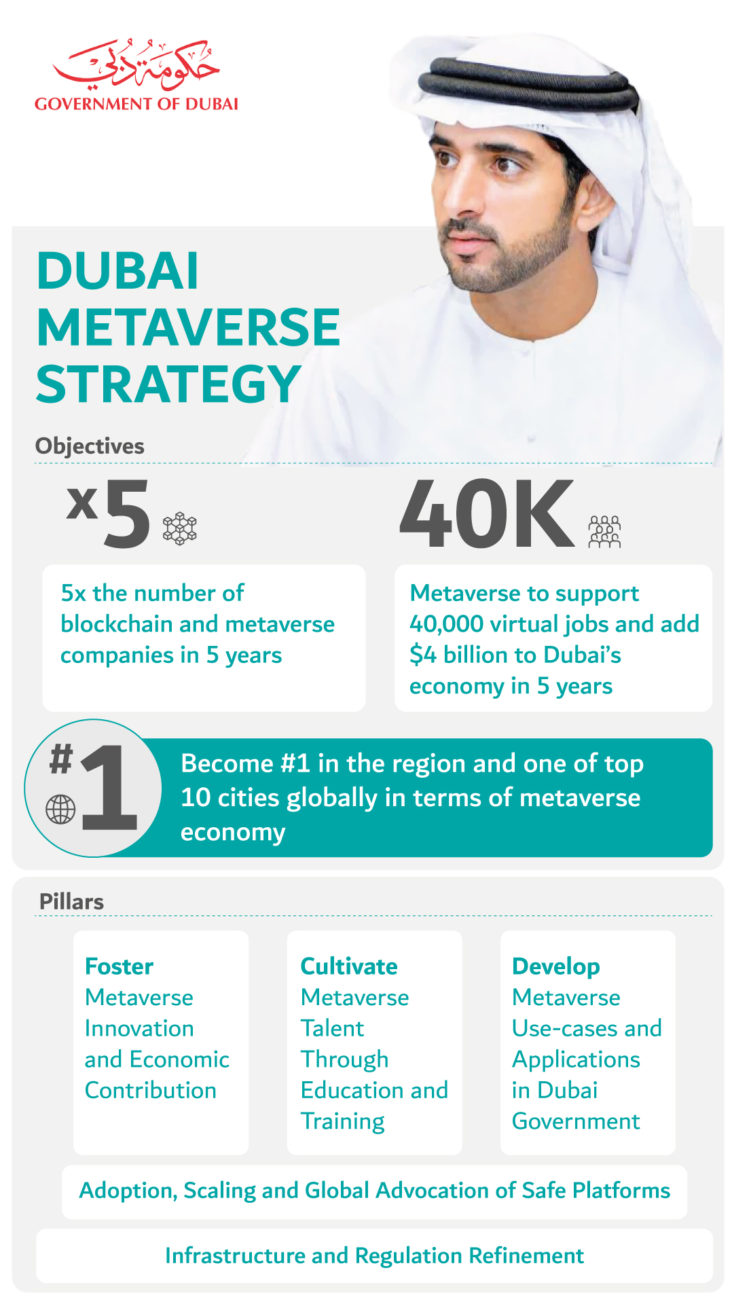Hamdan Bin Mohammed Launches Dubai Metaverse Strategy

In line with the directives of His Highness Sheikh Mohammed bin Rashid Al Maktoum, Vice President, Prime Minister and Ruler of Dubai, H.H. Sheikh Hamdan bin Mohammed bin Rashid Al Maktoum, Crown Prince of Dubai and Chairman of Dubai Executive Council, today launched the Dubai Metaverse Strategy that aims to turn Dubai into one the world’s top 10 metaverse economies as well as a global hub for the metaverse community.
His Highness Sheikh Hamdan bin Mohammed underscored the importance of consolidating Dubai’s status as a hub offering the most advanced ecosystem for the metaverse and as a frontrunner in adopting digital solutions globally, which reflects the ambitious vision of His Highness Sheikh Mohammed bin Rashid Al Maktoum for transforming the emirate into a global capital of advanced technologies, primarily artificial intelligence (AI) and Web3.
The strategy aims to build on Dubai’s achievement of attracting more than 1,000 companies in the fields of blockchain and metaverse. It also promotes Dubai’s ambitions to support more than 40,000 virtual jobs by 2030. This would further boost Dubai’s economy and support the UAE government’s vision of increasing the number of blockchain companies by five times the present number.
Sheikh Hamdan said that Dubai is making great strides in enhancing its position as a global testbed for metaverse technology while investing judiciously in building capabilities and talent in creating the region’s most robust and largest ecosystem for the metaverse community. His Highness added that adopting new technologies will be a stepping stone in Dubai’s vision to use future technologies to create new work models in vital sectors and increase the metaverse’s impact on regional and global economies.
Commenting on the launch of the Dubai Metaverse Strategy, Omar bin Sultan Al Olama, Minister of State for Artificial Intelligence, Digital Economy, and Teleworking Applications, and Deputy Managing Director of the Dubai Future Foundation, reiterated the importance of designing the future with new digital strategies for adopting the metaverse in vital sectors. He added that the metaverse would drive the UAE’s and Dubai’s efforts to provide innovative solutions, positively impact people’s lives, and transform the city into one of the smartest hubs worldwide offering new economic opportunities.
Al Olama said the Dubai Metaverse Strategy is in line with the objectives of the UAE AI Strategy to enhance the country’s status as one of the world’s leading countries in futuristic sectors by investing in new initiatives and empowering talent to drive digital transformation and the adoption of future technologies.
The Dubai Metaverse Strategy aims to foster innovation, enhance the metaverse’s economic contributions through R&D collaborations, and promote advanced ecosystems utilising accelerators and incubators that attract companies and projects to Dubai.
The strategy emphasises fostering talent and investing in future capabilities by providing the necessary support in metaverse education aimed at developers, content creators and users of digital platforms in the metaverse community.
The Dubai Metaverse Strategy supports the development of Web3 technology and its applications to create new governmental work models and development in vital sectors, including tourism, education, retail, remote work, healthcare, and the legal sector. The strategy also aims to develop global standards in building safe and secure platforms for users and develop metaverse infrastructure and regulations to accelerate the adoption of these technologies.
The strategy’s key pillars focus on extended reality (which blends the physical and virtual worlds), augmented reality (AR), virtual reality (VR), mixed reality, and digital twins (a virtual representation of an object or system). The strategy aims at leveraging real-time data, using machine learning and IoT, and employing AI simulation and blockchain to enhance the human thinking processes.
Data, network, cloud, and edge computing are technology pillars of the metaverse strategy that focus on real-world data that is obtained, validated, stored, processed, and managed. Other pillars include promoting the full deployment of 5G networks to enable edge computing and provide on-demand computer system resources. Edge computing allows data to be collected, stored, and processed locally via smart devices and local networks instead of the cloud.
VR and AR are two key enablers of the metaverse, responsible for 6,700 jobs and contributing US$500 million to the UAE’s economy, which is expected to increase significantly in the future. The metaverse provides an array of economic opportunities. Globally, the value of venture capital and private equity financing in the metaverse reached US$13 billion in 2021, while real estate sales in the metaverse surpassed US$500 million last year.
Second Life – a virtual world in which participants can explore fantasy landscapes and build their own – contributed more than $650 million to global GDP in 2021. The metaverse also achieved 200 strategic partnerships with Sandbox, a decentralised gaming virtual world, which includes the launch of the Warner Music Group as a music-themed virtual world in the metaverse.
Analysts estimate that the metaverse will contribute up to US$5 trillion to the global economy by 2030. The market value of NFTs is expected to reach $80 billion, while consumer spending on in-game purchases is reckoned to reach US$75 billion by 2025. Recent studies show that the daily active users on Roblox, one of the leading global metaverse communities, has increased to 55 million. At the same time, 59 percent of global consumers are keen to transition at least one of their everyday activities to the metaverse.
H.H. Sheikh Mohammed bin Rashid Al Maktoum directed government teams to start developing the Dubai Metaverse Strategy 60 days before its launch. The strategy promotes the employment of a connected network of virtual spaces to enhance the community’s wellbeing in Dubai and enhance initiatives making it a role model in metaverse technologies with a robust digital infrastructure.


